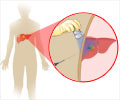Antigens and Antibodies as Tumor Markers
Cancer-specific antigens and antibodies are successfully employed as Tumor markers.
Carcinoembryonic Antigen (CEA) is a cancer-specific protein that is also used as a tumor marker. The CEA was one of the early oncofetal antigens to be used for clinical diagnosis and disease management.
CEA is a complex glycoprotein (molecular weight 20,000) that can be found on the plasma membrane of cells of the developing fetus and on different types of cancer cells. From here it is released into the blood.
CEA was first identified in malignancies of the colon. Later studies confirmed its elevated levels in cancers of the lung, stomach, breast, ovaries and the pancreas. It is also found in non-malignant conditions such as inflammatory bowel disease, cirrhosis, pancreatitis and chronic lung disease. Therefore testing for CEA is not the final diagnosis for a malignant condition. It is a warning sign that more tests need to be done to overrule a condition.
The level of CEA is analyzed through a simple blood test. In an individual who has undergone treatment for bowel cancer, an increase in CEA level can be an early indication that the cancer is recurring. It should alert the doctor to the need for specialized tests for the patient. Overall, CEA testing is very useful in monitoring the course of the disease, especially in case of colon cancer, and also the response of the patient to the treatment.
CA125 is another antigen that can be detected in 80 percent of (non-mucinous) ovarian carcinomas; its concentration is directly dependant on the patient's prognosis. It is also a good indicator regarding a patient’s response to treatment. CA125 may also be elevated in other type of cancers including pancreatic, lung, endometrial, breast, and colon.
Oncofetal antigens which are found in low quantities in adults but increases in volume in patients with malignancies also function as tumor markers.
CA19-9 is a monoclonal antibody that detects a monosialoganglioside that is found in patients with Gastrointestinal adenocarcinoma.












